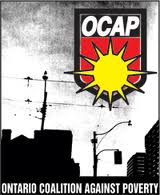Just because spring is around the corner does little to protect the Torontonians who are without permanent housing.
Toronto’s Mayor, Rob Ford, and his right-wing allies brush off any news of an underlying crisis within the shelter system — even going to far as brushing off any news of homeless deaths and believing that all individuals who sleep out rough on the street choose to do; nevermind that the shelter system runs at almost full capacity to full capacity night after long winter night.
He cannot just duck and cover that “spring is around the corner” as the solution to this city’s current housing problem. The problem of over-crowding in the shelter system year round is well documented.
Speaking of beds, Rob Ford commented, “We don’t need more spaces. We have over 100 empty beds a night,” he said. “We have to be efficient. You want to open up 500 empty beds? That’s just a waste of taxpayer money.”
According to the Ontario Coalition against Poverty (OCAP) – active in this city for more than 20 years – Ford is choosing to ignore the plight of the city’s poor and homeless.
OCAP stated in their press release, “By the City’s own admission, shelters are operating at 96% capacity. On top of this, the daily experiences of homeless people, advocates and front line workers lead to the inescapable conclusion that this City’s shelter system is overloaded and in crisis.
When spaces are over 90% capacity the overcrowding creates tension, conditions worsen and for many are intolerable. This small 3 – 4% margin of availability does not account for beds for women, co-eds, families, or for people who are unable for reasons of safety to go to certain spaces. In the Shelter Support and Housing Administration’s own report, they admit to occupancy bed-checks being done at 4am –long after people have tried to seek out a space.”
OCAP has recently been to City Hall three times in total.
On two of those occasions – March 7 and March 18, OCAP had turned City Hall into a temporary homeless shelter; where people were invited to bring their sleeping bags and blankets.
On both occasions, police announced to the crowd that the building would be shutting down for the night at 9:30 pm. Anyone staying after that time – including some who had nowhere else to go – was booted out and received a ticket for trespassing. One individual was taken to a nearby police division and held for a few hours on March 7, 2013.
According to OCAP, “For the past few months, OCAP and allies have been raising the alarms
around a series of homeless deaths and consistent overcrowding in the shelters. We have occupied space in front of Ford’s office and then again at Metro Hall to demand that additional shelter space be opened up. The response of Ford and his supporters has been to attack those speaking out, to blatantly make up numbers, and to dismiss deaths on the streets as ‘personal choice’.
On Monday March 18, 2013, at 9:00 am, a small group of OCAP activists returned to City Hall once again. It was again to demonstration against the number of unnecessary homeless deaths on Toronto’s streets and the lack affordable and dignified solutions to the housing crisis.
Through continued pressure, the Ontario Coalition Against Poverty (OCAP) and the Community Development and the Recreation Committee are advocating for 172 new shelter beds to open.
The recommendation reads, “On an interim and emergency basis, activate all of the 172 flex beds available throughout the shelter system with the aim of achieving an occupancy rate closer to 90% occupancy in the short term;”
Now, the deal is not in the bag.
The committee has unanimously voted to enhance the “flex” beds system, normally deployed for cold weather alerts and other emergencies, to bear the increase. The flex beds are not really even beds, but mattresses placed on the floors of eighteen existing shelter facilities across the city.
The next step in this process is that the recommendation from the committee will be voted on by city council.
I’m sure OCAP and its allies will be back to continue to lay pressure on City Hall. OCAP walked away with the promise of a more open “flex bed” system but this was far from their rallying cry to open up new, modernized shelter beds within the system and build more affordable housing in Toronto. Wait types for certain types of affordable housing can be up to ten years long.



